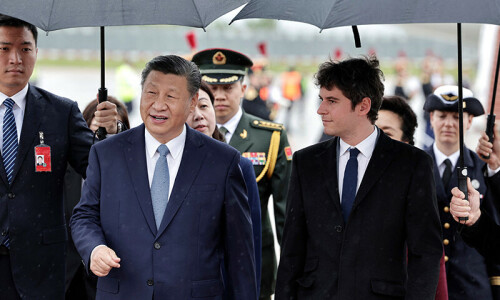COLOMBO: Sri Lanka’s president on Sunday reappointed as prime minister the same man he sacked from the job nearly two months ago, ending a power struggle and immediately setting off an uneasy cohabitation government.
Ranil Wickremesinghe, whose shock dismissal in late October threw Sri Lanka into an unprecedented constitutional crisis, was sworn in at a closed-door ceremony in the president’s office in Colombo.
In a scathing attack on Wickremesinghe and his United National Party (UNP), President Maithripala Sirisena said he grudgingly gave the job back and intended to check his premier every step of the way.
“I still believe that I should not have made Ranil Wickremesinghe the prime minister, but I bow to the wishes of the majority in parliament,” the president said. “But, I don’t know how far we will succeed in fulfilling the wishes of our people.”
Sirisena came to power in January 2015 with the help of Wickremesinghe’s UNP, but in the past three years they have drifted apart with clashes coming to a head when the latter was sacked in October.
The 69-year-old Wickremesinghe refused to step aside since being dumped and replaced by controversial strongman Mahinda Rajapakse — leaving the country with two men claiming the premiership and no functioning government.
The ousted premier had long asserted that his dismissal was illegal, a view supported by Sri Lanka’s parliament which six times voted against Rajapakse’s claim to rule during tumultuous sessions that erupted into brawls.
The acrimony between the two leaders was underlined on Sunday when Sirisena berated Wickremesinghe and his supporters at length following the swearing-in, according to a 45-minute video released by the presidential secretariat.
After the frosty reception, which Sirisena closed to the press, the reinstated premier thanked parliament and “all those who campaigned to restore democracy”.
“The first priority is to restore normality,” he said in a brief address to the nation. “The work we initiated had been brought to a standstill.”
There was no immediate reaction from Rajapakse, who stood down on Saturday. But Namal Rajapakse, his son and also a legislator, publicly extended his congratulations to Wickremesinghe.
India, which like the United States and others in the global community urged the warring factions to resolve their differences and refused to recognise Rajapakse’s government, welcomed an end to the power struggle.
“This is a reflection of the maturity demonstrated by all political forces, and also of the resilience of Sri Lankan democracy and its institutions,” India’s foreign ministry spokesman said on Sunday. Wickremesinghe said he would form a cabinet in the coming days.
Published in Dawn, December 17th, 2018















































Dear visitor, the comments section is undergoing an overhaul and will return soon.